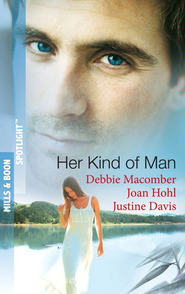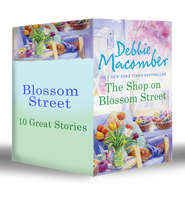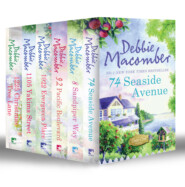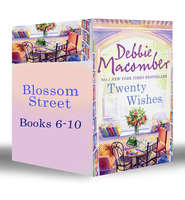По всем вопросам обращайтесь на: info@litportal.ru
(©) 2003-2025.
✖
Thursdays at Eight
Автор
Год написания книги
2018
Настройки чтения
Размер шрифта
Высота строк
Поля
Last night, I started thinking about my word, considering various possibilities. I still hadn’t found the right word. It’s like trying on dresses at Nordstrom’s for a special occasion. I only need one and I want it to be perfect. It has to fit properly, look wonderful and feel great. My thoughts went around and around—Steve, my job, Amy and Brian. My word for the year—love? Change? Something else? Strangely, unexpectedly, I found myself remembering Lauren. Lauren. My baby daughter, whom I never had a chance to know. The baby I held in my arms so briefly. Born too soon, she died during the first week of her life, nearly thirty-six years ago. Every year on the date of her birth, Steve would bring me a bouquet of daisies, to let me know he hadn’t forgotten her or the pain we endured as young parents, losing our first child. I’m really not sure why I started thinking about Lauren just then.
Determined to dwell on the present and not the past, I turned my attention to searching out a suitable word for the year. It took a while but I found one that feels right for me. As I sat in the shadows, unable to sleep, listening to the grandfather clock tick away the minutes, my word came to me.
TIME.
I’m fifty-seven. In three years I’ll be sixty. Sixty. I don’t feel close to sixty and I don’t think I act it. Still, it’s the truth, whether I choose to face it or not. There always seemed to be so much time to do all the things I’d planned. For instance, I always thought that someday I’d climb a mountain. I don’t know exactly why, just because it sounded like such a huge accomplishment, I guess. Now I know I won’t be doing any mountain-climbing, especially at this stage of my life. It all comes down to choices, I guess. Besides, I’ve got other mountains to climb these days.
At one point, when we were in our twenties, Steve and I wrote a list of all the exciting things we were going to do and the exotic vacations we planned to take. The years slipped away and we were caught up with raising our family and living our lives. Those dreams and plans got pushed into an indefinite future. We assumed there’d always be time. Someday or next year, or the year after that. This is a mistake I don’t intend to repeat and why the word time is appropriate for me. I want to be aware of every moment of my life. And I want to choose the right plans and dreams to fulfill in the years that are left to me. As soon as I settled on my word, I was instantly tired and fell promptly asleep.
Because I didn’t go to sleep until after two, I slept late. I didn’t make breakfast until past noon. I had the television on for company, but football’s never interested me. That was Steve’s game, though, and I found it oddly comforting to keep the channel on the Rose Bowl. For a few hours I could pretend that my husband was with me. The house didn’t feel quite as big or as empty.
The house…that’s something else I have to consider. I should make a decision about continuing to live here. I don’t need three thousand square feet, but this was the home Steve and I bought together, where we raised our family. With the way real-estate prices have escalated, I’m sitting on a lot of money that could well be invested elsewhere.
It’s silly to hold on to this place. The house was perfect when Andrew and Annie came to spend the weekend. Two rambunctious grandchildren need all the space they can get. It didn’t bother me then or when Brian lived at home. We needed a big house in order to stay out of each other’s hair, but for just me…Actually it’s the thought of getting it ready to sell—sorting through all the stuff that’s tucked in every nook and cranny, then packing up fifty-seven years of accumulated junk—that’s giving me pause.
After Steve died, my friends advised me to delay any major decisions for twelve months. That’s good advice to remember now. What I’m experiencing is a second loss. The loss of my children. I’m the only Kenyon left in Willow Grove.
I’m not entirely alone, however. My friends are here—those I’ve known all my married life, although it seems we’ve drifted apart since Steve died. My new friends live here, too—the women I met in the journal-writing class. I’m grateful to Sandy O’Dell for recommending I enroll. It was exactly what I needed, and I’ve learned a lot about myself through the process of writing down my thoughts every day. I wish now that I’d kept a diary when I was younger. Perhaps then I’d have found it easier to understand and express my own feelings.
Our teacher, Suzanne Morrissey, was an English professor assigned to the class at the last minute. Unfortunately, she didn’t have any idea where to start, although she gave it a good try. Mostly, she had us read and critique literary journals, which was interesting but not all that useful. Still, I suppose keeping a journal isn’t really something that can be taught. It’s something you do.
What came out as I wrote in my journal was this deep sense of loss and abandonment I’ve felt since Steve’s death. I’d assumed that after six years I’d dealt with all that, but coupled with Amy and Jack’s move to the mid-West, followed by Brian’s moving out…well, it’s too much.
Amazing, isn’t it, that I can cope with one crisis after another in my job at the hospital yet feel so defeated by the events in my own life?
Clare and I have been spending quite a bit of time together. That’s probably natural, her being recently divorced and me a widow. Clare’s situation is similar to mine a few years back when I realized, to my dismay, that my friends came in couples. Most of them are matched sets. Like me, Clare has come to recognize that she lost not only her husband but the framework of her social world, which crumbled right along with the marriage. Although her circumstances are different from mine, the outcome has been the same. The dinners, card-playing, even something as uncomplicated as a night at the movies—it all seems to be done in pairs.
Within a few months of Steve’s death, I found myself drifting away from the very people I’d once considered our dearest friends. We have so little in common anymore that I couldn’t see the point.
It was awkward, too. People didn’t know what to say after the accident. In fact, I didn’t want anyone to say anything. What I needed was someone to listen. Few of my friends understood that.
Clare’s had a hard time adjusting to the divorce. Losing the people she once considered her friends is a bitter pill after everything she’s been through with Michael. Maybe she should have taken it up with the attorney: custody of the friends. Who gets to stay friends with whom?
Really, it’s odd that Clare and I should have bonded at all. We’re very different kinds of people; in our previous lives, we probably wouldn’t have felt the slightest interest in knowing each other. Right now, Clare’s angry and bitter and struggling not to be. I still have my share of anger, too, yet I’m more accepting of the events that led me to this point (but then, my husband didn’t leave me for another woman). I enjoy Julia and Karen, too, but it’s Clare I identify with most. Perhaps it’s the loneliness. That’s something we both understand. Something people can’t truly appreciate until they’ve experienced it themselves.
Time. This should be the best time of my life. I have a fabulous career. When I started out at Willow Grove Memorial, I never dreamed that one day I’d end up as the hospital administrator. My children have grown into responsible adults. I had a wonderful marriage and I’ve got lots of memories to sustain me. Yes, this should be a good time, and it will be—once I learn how to live contentedly by myself.
Liz stared at the phone on her desk, dreading its ring. Her Monday had begun badly, and already she could see that this first week of the new year was going to be a repeat of December, with many of the same problems she’d faced then. The hospital was no closer to a new contract with the nurses’ union, and the state health inspectors were scheduled for Wednesday afternoon. In addition, she’d had several hot flashes and been downing Chai tea with soy milk all morning. This was not a good start to the year, she thought gloomily.
She got up and removed her jacket, placing it on a hanger. Then she unfastened the top button of her white silk blouse and rolled the long sleeves past her elbows. Picking up a piece of paper from the desk, she fanned her flushed face and paused to look out the sixth-floor window to the parking lot below.
“I can see I’ve cornered you at a good moment.” It was a deep male voice, one Liz immediately identified.
“Dr. Jamison,” she said in a crisp, professional tone. He was rarely at Willow Grove Memorial. Most of his patients were admitted to Laurelhurst Children’s Hospital, where he worked primarily with premature infants. Sean Jamison was an excellent pediatrician but he had a well-deserved reputation for being demanding, impatient and arrogant—an arrogance that found expression in his womanizing behaviour. Liz couldn’t fault his medical skills, but when it came to dealing with staff, he could use a few lessons in emotional maturity.
“Come now,” he said, his voice seductive, “we know each other well enough for you to call me Sean.”
Liz stepped behind her desk and resumed her seat, motioning for him to sit down, too. “How can I help you?”
“This is more of a social visit.” He claimed the closest chair and struck a casual pose, crossing his legs and balancing one ankle on the opposite knee. He relaxed, leaning back as if he was settling in for a long visit. “I stopped by to see how you’re doing.”
“I’m busy,” she said quickly, thinking he might have time for chitchat but she didn’t.
He ignored her lack of welcome. “How was your New Year’s Eve?”
So that was it. He’d asked her out—well, sort of. What he’d done was propose that they get together, the invitation flavored with sexual innuendo, and she’d promptly refused. Although she’d been a widow for six years, Liz rarely dated. Opportunities were available, had she been interested. For the most part, she wasn’t.
“I had a lovely night. What about you?” From Sean’s reaction she’d realized it wasn’t often a woman turned him down. Liz had certainly heard all the rumors about Dr. Jamison. He was tall, sandy-haired and craggy-faced, with an undeniable presence; comparisons to Harrison Ford were regularly made—by women from twenty to sixty. Sean possessed the ageless appeal of a man who was smart, handsome, wealthy and single. The hospital was full of gossip about him, and more than one of the female nurses had fallen under his spell. Divorced for ten years, Sean Jamison seemed to consider himself a prize to be caught. He never dated anyone for long and Liz disliked his arrogant approach in romance as much as she deplored his indifference to staff relations.
Liz and Steve had met in high school, and other than the normal ups and downs that were part of any longstanding relationship, they’d had a good, solid marriage. She wasn’t interested in a fling, no matter how handsome or wealthy the man.
Sean’s attention confused her, although she’d never allow him to see that. From what she understood, he generally went out with women several years younger than he was. While Liz kept fit and watched her diet, she wasn’t a trim thirty-year-old. With loving humor, Steve had suggested that her hourglass figure had begun to show an hour and ten minutes. She still smiled whenever she thought of that.
“Stayed home New Year’s, didn’t you?”
“Yes,” she admitted, and crossed her arms, letting him know she wasn’t open to a discussion involving her private life, “but as I said, I had a perfectly lovely evening.”
“All alone?”
“I happen to enjoy my own company.” Standing, she braced both hands on the edge of her cherrywood desk. “I’m sorry to cut this short, but I have a meeting in ten minutes.”
“I’m willing to give you another chance to go out with me.”
“No, thanks.”
He grinned, dismissing her rejection as though it was her loss, not his. Then he stood and turned away, ambling toward the door.
“Sean,” she said, shocking herself just a little.
His smile firmly in place, he raised his eyebrows. “Change your mind?”
“As a matter of fact, no,” she said, knowing that for some reason she didn’t want this conversation to end the same way the others had.
“No?” He arched his eyebrows again, affecting a look of mild surprise.
“This is the second time you’ve stopped by my office to ask me out.”
He didn’t comment.
“I’ve turned you down both times,” she reminded him. “And I’m wondering if you’ve asked yourself why.”
“It’s self-explanatory,” he murmured. “You’re afraid.”
“It’s more than that.”
He shrugged carelessly, and she could practically read his response. No big deal. Plenty of women willing to take him up on his offer.
“It’s your attitude.”











